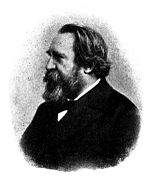- Theodor Meynert
-
Theodor Meynert 
Theodor MeynertBorn June 15, 1833
DresdenDied May 31, 1892
KlosterneuburgNationality Austria Fields Neuropathology Institutions University of Vienna Alma mater University of Vienna Known for cytoarchitectonics Influenced Paul Flechsig, Sergei Korsakoff Theodor Hermann Meynert (15 June 1833 - 31 May 1892) was a German-Austrian neuropathologist and anatomist who was born in Dresden.
In 1861 he earned his medical doctorate, and in 1875 became director of the psychiatric clinic associated with the University of Vienna. One of his better known students in Vienna was Sigmund Freud, who in 1883 worked at Meynert's psychiatric clinic. Meynert later distanced himself from Freud because of the latter's involvement with practices such as hypnosis. Meynert also ridiculed Freud's idea of male hysteria. Other famous students of Meynert's were Russian neuropsychiatrist Sergei Korsakoff (1854-1900), German neuropathologist Carl Wernicke (1848-1905) and Swiss neuroanatomist Auguste-Henri Forel (1848–1931). Meynert's work was an important influence in the career of German neuropathologist Paul Flechsig (1847-1929).
Meynert's work was largely focused on brain anatomy, pathology and histology, including the mapping of its intricate pathways and topography. He made many contributions involving the study of the cellular architecture of the brain and is often considered to be the founder of cerebral cortex cytoarchitectonics.
Meynert developed theories in regards to correlations between neuroanatomical and mental processes. He conceptualized that a coupling between one mental association and its temporal successor as a literal contact between cortical nerve cells linked to one other by nerve fibers, and a series of cortical associations could therefore be construed as being a "train of thought". He also theorized that ideas and memories are to be envisioned as being attached to specific cortical cells. Meynert's aim was to establish psychiatry as an exact science based on anatomy. In his 1884 textbook Psychiatrie. Klinik der Erkrankungen des Vorderhirns, Meynert forewords with the statement:
"The reader will find no other definition of 'Psychiatry' in this book but the one given on the title page: Clinical Treatise on Diseases of the Forebrain. The historical term for psychiatry, i.e., 'treatment of the soul,' implies more than we can accomplish, and transcends the bounds of accurate scientific investigation."
Meynert contributed his work concerning the structure of the mammalian brain to Salomon Stricker's (1834-1898) Handbuch der Lehre von den Geweben des Menschen und der Thiere. He has several anatomical structures named after him, including the basal optic nucleus of Meynert, the substantia innominata of Meynert and "Meynert cells", which are solitary pyramidal cells located in the cerebral cortex near the calcarine fissure. In 1869 Meynert described the dorsal tegmental decussation of the left and right tectospinal and tectobulbar tracts, located in the mesencephalon (midbrain). This was to become known as Meynert's decussation or fountain decussation.[1][2][3]
Selected written works
- Die Bloßlegung des Bündelverlaufs im Großhirnstamme, 1865
- Der Bau der Großhirnrinde und seine örtliche Verschiedenheiten nebst einem pathologisch-anatomischen Korollarium (The Construction of the Cerebral Cortex and its Local Differences, including a Pathological-Anatomical Corollary), 1868
- Vom Gehirn der Säugetiere (The Brain of Mammals) in Salomon Stricker's Handbuch der Lehre von den Geweben der Menschen und Tiere, 1869
- Klinik der Erkrankungen des Vorderhirns (Clinical Disorders of the Forebrain), 1884
- Klinische Vorlesungen über Psychiatrie (Lectures on Clinical Psychiatry), 1890
Notes
- List of publications taken from an article on Theodor Meynert from the German Wikipedia.
External links
- [1] "Theodor Meynert (1833-1892), pioneer and visionary of brain research" by F. Seitelberger, PMID: 11619863
- [2] The Neurological Origins of Psychoanalysis by Raymond E. Fancher
- [3] Review from Psychological Science Vol. 7, No. 2, March 1996 by Frederick Crews
- Theodor Hermann Meynert @ Who Named It
Categories:- 1833 births
- 1892 deaths
- German pathologists
- People from Dresden
- People from the Kingdom of Saxony
- University of Vienna alumni
- University of Vienna faculty
Wikimedia Foundation. 2010.
